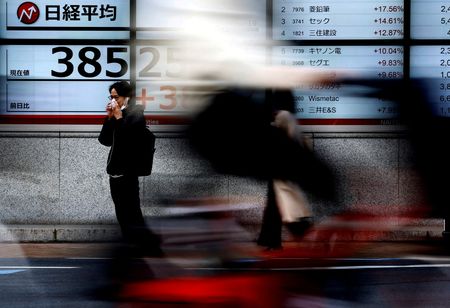By Jamie McGeever
(Reuters) – A look at the day ahead in Asian markets.
Asian markets on Monday will be hoping to bounce back from one of the most bruising weeks this year, but that won’t be easy given the hawkish tone of recent Fed comments, heightened Middle East tensions and deepening weakness in tech stocks.
Wall Street fell sharply on Friday with the S&P 500 sealing its longest losing streak since October 2022 and tech darling Nvidia’s 10% plunge dragging down the Nasdaq, while demand for safe-haven Treasuries, gold and the Swiss franc rose.
While there was no escalation in the Iran-Israel conflagration over the weekend, investors are cautious.
The MSCI Asia ex-Japan equity index fell 3.7% last week to a two-month low. That was the biggest weekly decline since August, with rising U.S. bond yields, a strong dollar and wobbly global stock markets taking their toll.
Investors are still digesting the IMF/World Bank Spring meetings and related conferences and events from last week, from which one of the clearest messages was how concerned officials are becoming with the strength of the dollar.
The United States, Japan and South Korea issued a joint statement on the issue, ECB rate-setter Robert Holzmann said the ECB probably won’t cut rates this year as much as planned if the Fed doesn’t move, and the IMF urged Asian central banks to focus on domestic inflation rather than following the Fed too closely.
Indonesia’s central bank on Friday intervened in the FX market “more boldly to maintain market confidence” as the rupiah weakened, while India’s rupee was lifted from a record low on Friday by likely intervention from the central bank.
South Korea’s central bank chief, meanwhile, said the bank is ready to take steps to stabilize the exchange rate if needed.
Attention remains fixed on Asia’s most liquid FX market and whether, with the dollar hovering at 34-year peaks near 155.00 yen, Japanese authorities will back up recent warnings against the yen’s depreciation with intervention.
So far, it has been just talk from Tokyo.
Bank of Japan Governor Kazuo Ueda said in Washington on Friday that the central bank will “very likely” be raising interest rates if underlying inflation continued to go up.
The latest positioning data from U.S. futures markets showed hedge funds and speculators increased their aggregate net short yen position in the latest week to a new 17-year high.
Monday’s economic calendar sees the release of Indonesian trade figures and Taiwan’s unemployment rate, while the People’s Bank of China is expected to leave its one-year and five-year loan prime rates on hold at 3.45% and 3.95%, respectively.
Chinese markets will get their first chance to react to new measures announced on Friday aimed at promoting overseas investment in its technology sector.
Here are key developments that could provide more direction to markets on Monday:
– China interest rate decision
– Indonesia trade (March)
– Taiwan unemployment (March)
(By Jamie McGeever; Editing by Josie Kao)










